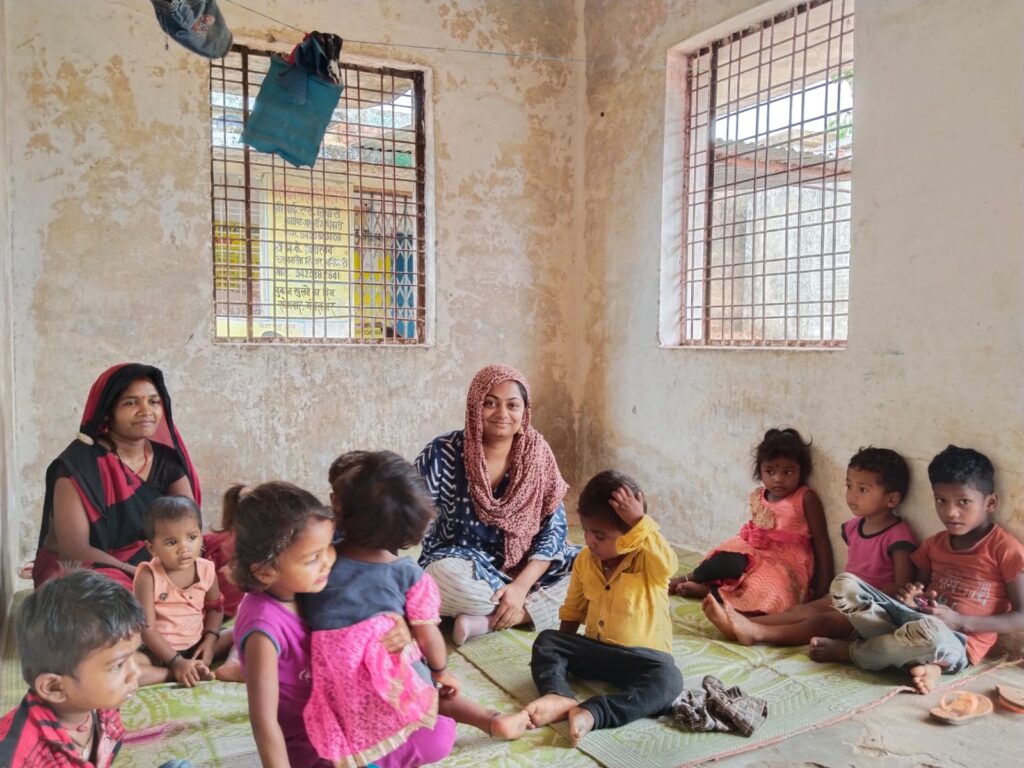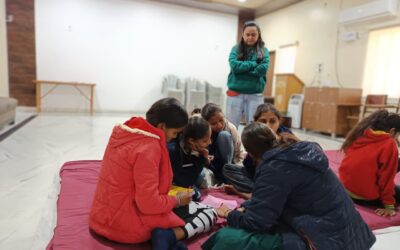As a fellow, the excitement of a field visit is unparalleled, especially before one has experienced it. This is largely due to the underlying fact that the human mind is curious for the unknown. In my case, the first month of the fellowship was about constantly nodding my head to indicate a ‘yes’ for every opportunity, taking in and in and in everything that came my way.
My organization, Jan Swasthya Sahyog (JSS) has been working in the public health system in Chhattisgarh and Madhya Pradesh. They have introduced several initiatives and have collaborated with the central as well as state governments. It was a month of learning about and understanding these initiatives. Here. I’m writing about two of my experiences, one in the Phulwari program and the other in the counselling program.
Phulwari Program
The first event I participated in was at ‘Phulwari’, a creche-like system where a local woman from the village looks after the children aged 6 months to 3 years during the day when their parents are at work. This initiative started by JSS in Chhattisgarh and Madhya Pradesh aims to ensure overall well-being of the children through a series of activities that include eating nutritious food, learning alphabets, numbers, playing, and sleeping.
The Phulwari system ensures that the daily wages of the parents remain intact while keeping the children engaged and healthy. It also safeguards the education of the elder sibling, who, under different circumstances, is entrusted with taking care of the younger ones, thus, unable to go to school.
Families that send their children to Phulwaris are primarily people from the village who earn daily wages, many of them traveling long distances for work everyday. Most of them fall Below Poverty Line (BPL). The vital element that sustains Phulwaris is the trust of parents on women who run it. They, in turn, uphold the faith their community has on their abilities and intent.
These centres help families maintain or improve their standard of living. Knowing their child is safe, they can continue to go to work or look for work. Some children have health issues like Sickle Cell Anemia, stunted growth due to malnutrition, and respiratory issues. At Phulwari, the recommended medicine is also given to the children suffering from Sickle Cell Anemia.
What I Saw
My visit to a Phulwari in Badi Tulli village was a fun experience. 12 out of the17 children enrolled had come that day. They seemed to be in a good mood, having woken up from their slumber a few minutes ago. It was heartening to see the bonding among children, especially Teertika who despite being barely three years old showed care and responsibility towards the younger ones. The woman managing the Phulwari told me that Teertika sees if everyone has eaten, is learning well and helps them when they are stuck or confused. Soon, she will have to leave the Phulwari and join pre-primary school. I really hope that she continues her education and doesn’t get devoid of it due to familial issues.

Counselling Program
The second significant initiative of JSS is the follow-up and counselling program for Sickle Cell Anemia patients. The counsellors work to perform multiple duties including follow-ups with current patients, attending new patients, counselling their families to get screened, and advising them on the Dos and Don’ts when suffering from Sickle Cell Anemia.
The group of people they work with, are primarily low income groups practicing farming and animal husbandry, having multiple health issues in the family. Many of them, even from the higher income groups, are often unaware of their health conditions and the precautions they need to take.
Counsellors get in touch with their patients through mobile phones and visit them in person. Until now, I thought that company CEOs and government officials were hard to get hold of, but now I can confirm that it’s equally or sometimes more difficult to get time from farmers. My perception about them was broken when I saw counsellors trying to meet farmers. Working on the farm comes with a range of other subsidiary activities.
An Urgent Case
In one instance, the counsellors for months, had been trying contact a farmer who was also a sickle cell patient. The family had lost both their children, one at 18 and another at 16 to Sickle Cell Anemia within a month earlier this year. The parents were tested positive for the disease. In addition, the team got to know from their neighbour that they were planning a third child which would be detrimental to the mother as well as the child. It was urgent to counsel them against it.
My urban mind was in a fix this whole time wondering why it was so important to have a child now after experiencing loss of the last two, and why couldn’t they go for adoption. I requested the counsellor to let me accompany her and assured her that I would just be a silent observer.
Why They Do What They Do
After an hour’s drive, we reached the village of Khanda. The street outside the patients’ house was eerily silent. Only a few months ago, the mother had mentioned that it was full of children’s noises. Now, it wears a deserted look.
The counselling session answered all the questions that were troubling me. The family was one of the richest in the village, owning 60 acres of land and other small businesses. They needed a progeny who would continue the family lineage. Adoption was unimaginable for them since they wanted an offspring to inherit their property. The parents, even though they were taking medicines irregularly, and would frequently fall sick, were getting better. The children did not feel the need to take medicines consistently as they appeared healthy. Sickle Cell Anemia is internal and often not physically visible. Hence, people don’t take it seriously.
My Thoughts
While reflecting on both the cases, I realize the importance of taking care of children’s needs and health right from the beginning to prevent deaths from diseases like Sickle Cell Anemia, and focus on longevity. I understood the relevance of creating awareness about the disease among educated youth since they can comprehend medical terms and decipher its consequences. Phulwaris did not exist when the teenagers of Khanda were infants. Their health was neglected even when it is deteriorating on the inside.
These two field visits ignited the researcher in me, to delve deeper into such issues. There are many stories, and all of them are equally important to be heard and documented. I’m looking forward to the journey ahead.




What the past should have been of the present teen is the present of the future teen! Analogous but set apart a few years.
Wonderful work Mahima….express ed so nicely….. experience s make us a better human being ..gd luck for your future
Nicely penned Mahima. Your each article is very interesting and gives us an inside glimpse of the villages. You are doing a great job going to rural India and researching about their lifestyle, health, education of children etc. Good job. Keep going. 👌👍